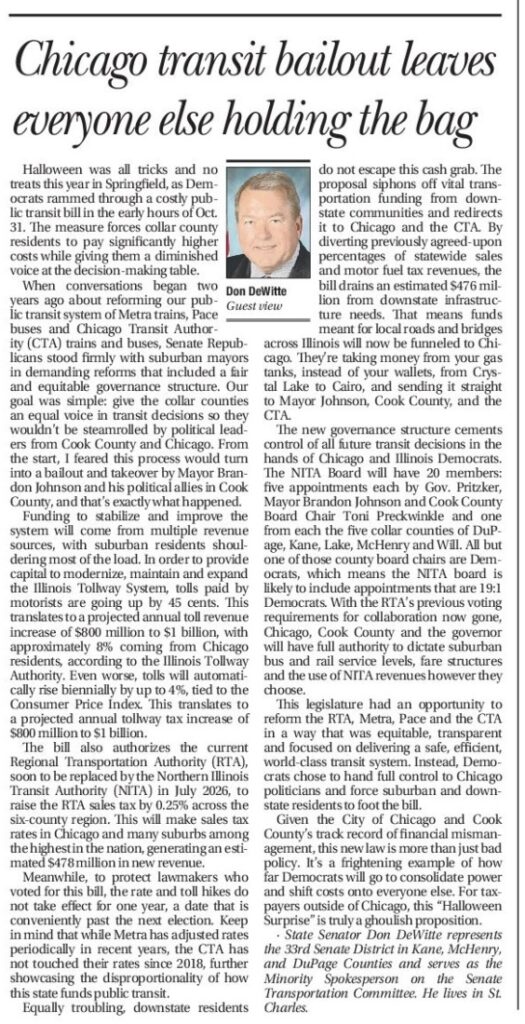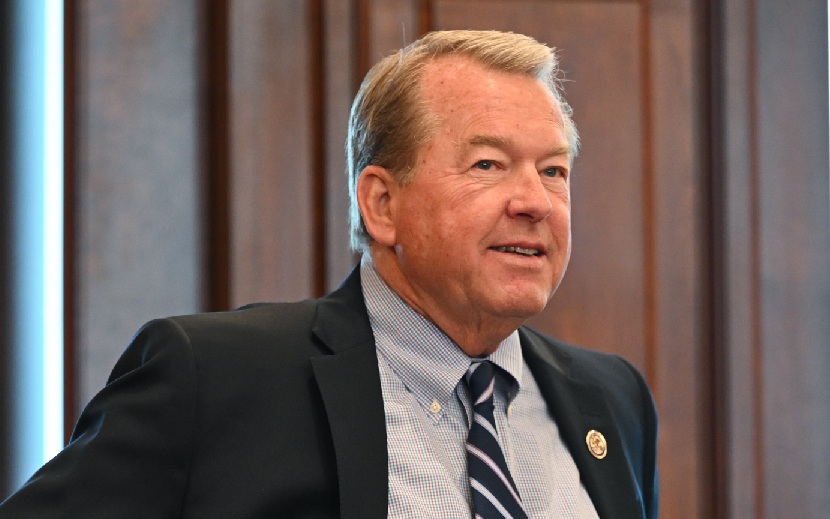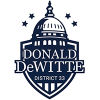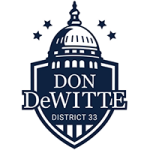DeWitte Hosts 6th Annual Fall Youth Advisory Council

Last week it was a privilege to host 60 of this region’s brightest high school students from across the 33rd District for my 2025 Fall Youth Advisory Council. My deepest thanks go out to officials at Burlington Central, Dundee Crown, Hampshire, Huntley, Jacobs, and St. Charles North and East High Schools for allowing your students to participate. The session was held at Judson University in Elgin.
Students are chosen for this program by school teachers and counselors, and students get to hear from three different community leaders who share their experiences and what drove them toward a career in the public sector, and they offer advice to emerging adults as they contemplate their post-high school plans. It is a non-partisan opportunity with a goal of energizing the next generation of leaders and driving home the importance of being an involved member of society.
The fall lineup of speakers included:
- Robb Tadelman, McHenry County Sheriff
- Lori Yates, Director of Events & Engagement for IL Senate Republicans and former White House Press Advance staffer for the President George W. Bush Administration
- Dr. Gene Crume, Jr., President of Judson University
My thanks go out to the speakers who took time out of their busy days to interact with the students. Each presenter spoke to the students and reserved plenty of time for Q and A. In the afternoon, students collaborated with their peers from other schools and developed legislative proposals for bills they would like to see become laws in Illinois. Students presented their bill ideas and at the end of the day the full group voted on the one bill proposal that will be put into bill language for our follow-up gathering in the spring of 2026.
During the spring YAC meeting, the bill will move through a mock legislative process complete with committee hearings and votes, and students will take on rolls of legislators (Democrat and Republican), lobbyists, members of the public providing testimony, journalists/bloggers, and even the Governor.
It is a wonderful way for emerging adults to learn about the political process and how important it is to have a voice in shaping public policy for the next generation.
Democrats Use Veto Session to Push Partisan Agenda
When lawmakers returned to Springfield for the fall Veto Session, only a handful of vetoes were up for potential consideration. In the end, only one vetoed bill was brought forward for reconsideration. Rather than focusing on vetoed bills, the session agenda quickly shifted toward advancing new and previously introduced legislation, including several controversial measures that have far-reaching consequences for taxpayers and businesses across the state.
Among the most heated measures were a sweeping public transit bailout for the City of Chicago that was rushed through with little to no time to review final bill language, a short-sighted tax plan known as “decoupling” that effectively raises taxes on Illinois job creators, an $8 billion energy rate hike, and a polarizing proposal to pave the way for physician-assisted suicide.
Senate Republicans criticized the priorities as well as the process of Springfield Democrats. Using Veto Session to push through major policy changes in the middle of the night, with little public input or debate, is irresponsible and dangerous. These measures will have lasting and permanent consequences for families, businesses, and communities across Illinois.
The Senate is not scheduled to return to the Capitol until mid-January for the start of the 2026 spring session. Click here to view the 2026 Senate session calendar.
DeWitte Leads Senate Republican Caucus in Post-Veto Session Messaging on Public Transit Reform Bill

As mentioned last week, as the Minority Spokesperson for the Senate Transportation Committee, I was heavily involved for the last two years in discussions related to public transit reforms for the State of Illinois. When we set out to solve a looming fiscal cliff for Metra, Pace, and the CTA and to reform the transit governance structure to provide greater accountability, I held high hopes that we would be able to come together to create legislation that solved current and future financial issues while putting in place a governance structure that was equitable in oversight board membership and voting authority.
As you know, the bill that ultimately came before the legislature during veto session fell short in many ways, especially for suburban transportation system users (including tollway users) and also for downstate residents who pay money via gas taxes to help improve their roads and bridges.
Last week I published an opinion piece in the Daily Herald that outlined my disappointment with the bill that was approved. You can read that op ed here.
Then, on Wednesday, I appeared on a bipartisan panel on Chicago Tonight to further discuss the legislation. Click here to view a portion of my comments from the Chicago Tonight segment.
DeWitte Co-Sponsors Bill to Expand Property Tax Relief for Senior Citizens

Illinois continues to face one of the highest overall tax burdens in the nation, with homeowners paying the highest effective property tax rate of any state. The heavy tax load has driven many residents, particularly seniors, to leave Illinois.
During the recent Veto Session, we took steps to ease that burden by passing Senate Bill 642, a measure designed to help seniors stay in their homes. I am a proud co-sponsor of this bill.
The proposal raises the maximum income limit for the Low-Income Senior Citizens Assessment Freeze Homestead Exemption over the next several years. Beginning in tax year 2026, the income limit would increase to $75,000, then to $77,000 in 2027, and to $79,000 in 2028 and beyond.
The aim of the legislation is to expand eligibility for the property tax freeze program to allow in-need seniors to qualify for relief and stay in their homes.
The measure passed the Senate unanimously and now heads to the Governor for his signature.
Physician-Assisted Suicide Legislation Advances to Governor’s Desk
In the early morning hours of October 31, lawmakers in the Illinois Senate voted on a controversial proposal that would legalize physician-assisted suicide in this state.
Senate Bill 1950, which was pasted as a “gut and replace” amendment into a bill originally having to do with food processing, would create the End-of-Life Options for Terminally Ill Patients Act. The measure allows adult patients diagnosed with a terminal illness and given six months or less to live to request medication from a physician to voluntarily end their lives.
The proposal passed in the Senate with the bare minimum number of votes (30) and now advances to the Governor’s desk for consideration. Governor Pritzker has two months to take action on the measure, but it remains unclear whether he intends to sign it into law.
Kane County Kids Invited to Family Reading Night with Judges
The Kane County Law Library, in collaboration with the Kane County 16th Judiciary, is excited to host its annual Family Reading Night with the Judges on Wednesday, November 19, from 6:30 to 7:30 pm at the Kane County Judicial Center. This special event features Judges Kevin Busch, Lark Cowart, and Keith Johnson reading their favorite bedtime stories. Children can tour a real courtroom, sit in a judge’s chair, and enjoy snacks, laughter, and stories—all while in pajamas!
Family Reading Night is designed for children in 2nd grade or younger, accompanied by an adult, and is part of a statewide initiative promoting family literacy, sponsored by the Illinois Secretary of State, State Librarian, and the Illinois State Library’s Illinois Center for the Book. For information, please contact the Kane County Law Library & Self Help Legal Center at 630-406-7126.
Open Enrollment Period Underway for “Get Covered Illinois”
The Open enrollment portal for Get Covered Illinois opened on November 1 and runs through January 15. This timeframe represents the annual opportunity for Illinoisans to enroll in, renew, or change their health insurance plans.
According the IL Department of Insurance, this year, Illinoisans will experience a new marketplace. Enrollees will apply for and enroll directly on GetCoveredIllinois.gov now that Illinois has officially transitioned to a state-based marketplace. They will also have access to increased support that is more tailored to their needs.
For coverage starting January 1, customers must enroll by December 15. Free, one-on-one enrollment help is available statewide from trained navigators and licensed brokers—in person, by phone, and online—with support in multiple languages. For more information or free assistance, visit GetCoveredIllinois.gov or call 1-866-311-1119 (TTY: 711).

